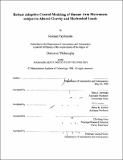Robust adaptive control modeling of human arm movements subject to altered gravity and mechanical loads
Author(s)
Tryfonidis, Michail
DownloadFull printable version (10.30Mb)
Other Contributors
Massachusetts Institute of Technology. Dept. of Aeronautics and Astronautics.
Advisor
Chi-Sang Poon.
Terms of use
Metadata
Show full item recordAbstract
It has been observed that during orbital spaceflight the absence of gravitation related sensory inputs causes incongruence between the expected and the actual sensory feedback resulting from voluntary movements. This incongruence results in a reinterpretation or neglect of gravity-induced sensory input signals. Over time, new internal models develop, gradually compensating for the loss of spatial reference. The study of adaptation of goal-directed movements is the main focus of this thesis. The hypothesis is that during the adaptive learning process the neural connections behave in ways that can be described by an adaptive control method. The investigation presented in this thesis includes two different sets of experiments. A series of dart throwing experiments took place onboard the space station Mir. Experiments also took place at the Biomechanics lab at MIT, where the subjects performed a series of continuous trajectory tracking movements while a planar robotic manipulandum exerted external torques on the subjects' moving arms. The experimental hypothesis for both experiments is that during the first few trials the subjects will perform poorly trying to follow a prescribed trajectory, or trying to hit a target. A theoretical framework is developed that is a modification of the sliding control method used in robotics. The new control framework is an attempt to explain the adaptive behavior of the subjects. Numerical simulations of the proposed framework are compared with experimental results and predictions from competitive models. The proposed control methodology extends the results of the sliding mode theory to human motor control. The resulting adaptive control model of the motor system is robust to external dynamics, even those of negative gain, uses only position and velocity feedback, and achieves bounded steady-state error without explicit knowledge of the system's nonlinearities. In addition, the experimental and modeling results demonstrate that visuomotor learning is important not only for error correction through internal model adaptation on ground or in microgravity, but also for the minimization of the total mean-square error in the presence of random variability. Thus human intelligent decision displays certain attributes that seem to conform to Bayesian statistical games.
Description
Thesis (Ph.D.)--Massachusetts Institute of Technology, Dept. of Aeronautics and Astronautics, 1999. Includes bibliographical references (leaves 159-164).
Date issued
1999Department
Massachusetts Institute of Technology. Department of Aeronautics and AstronauticsPublisher
Massachusetts Institute of Technology
Keywords
Aeronautics and Astronautics.